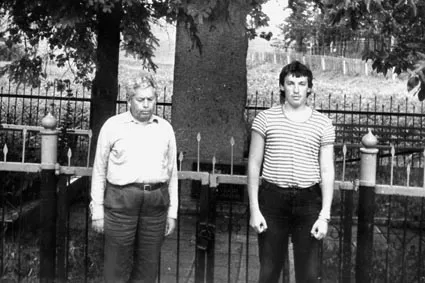This photograph shows me and my son in 1979 near the monument on the grave of Jews shot by fascists in ghetto. Here I'll tell you the story of their death.
Germans came to Ushachi on July 4, 1941. They did came: at our sector of the front fascist armies moved forward almost without any resistance. In fact on the 6th day of the war Minsk [capital of Belarus] was taken (Minsk is situated 250 kilometers far from Ushachi). Jews were in full confusion: what to do, where to move. Besides they did believe that Germans could do no harm to innocent old people and children. Only several families left all their property and ran away before Germans appeared. Those Jews who remained in Ushachi, perished later.
And at the end of summer 1941 all Jews were ordered to move to the left bank of the river to houses around the small synagogue (those houses were cleared out). So that was the way ghetto in Ushachi was organized. Children and old men, sick and disabled people moved there: it was their last shelter.
It happened on January 12, 1942. People in ghetto were ordered to stand in line. Germans said that they would be sent to the east by train. Jews moved forward under escort of submachine gunners. They covered several hundreds of meters, and the column was turned to the right (to the left bank of the river). Everyone who was still able to think realized that it was their final journey.
Here I'll retell you the story of my acquaintance, whom I met in 1950: 'The day before the execution Germans forced 20 strong men to dig a hole near the road. The ground was deep-frozen, therefore the hole came out not deep. Germans stopped the column in front of the hole, selected parties of 20-25 persons and shot them using submachine guns. Injured people were pushed down in the hole alive.'
2 days later Germans brought about 200 Jews from Kublichi shtetl to the same place. They were executed by shooting the same way as the previous group of Jews. Together with them and with his pupils my brother Isaak Lerman, the school teacher of German language was shot, too. He preferred to be taken through hell, but refused to work for Germans as interpreter.
In July 1944 I got to know that my native place was liberated from fascist occupation. I was eager to find my relatives. Communist Party leader (assistant of battalion commander in political and educational work) of our battalion sent a letter of inquiry to a military registration and enlistment office of Ushachi. [Military registration and enlistment offices in the USSR and in Russia are special institutions that implement call-up plans.] Soon I received a terrible message: the Lermans (my father, mother, brothers, their wives and children - 14 persons) were executed by fascists (shot together with hundreds of other Jews in 1942). I could not make a move crying.
After the end of the war only several families returned to Ushachi. Most of its inhabitants settled in Leningrad. By now only 2 of them remained alive in Leningrad. 2 more live somewhere in Israel, and 1 of them is in Los Angeles, in America. Only these 5 people remained from our large Jewish community, one among many Jewish communities in Belarus with similar destiny.
In 1950s inhabitants of Leningrad, Minsk, Vitebsk, Polotsk, etc. collected money and put iron fencing and a small cement obelisk on the tombs. The following text is written there: 'On January 14, 1942 on this place 925 Soviet citizens - inhabitants of Ushachi settlement and Kublichi village were executed by shooting by German soldiers.'
So every year after the end of the war the former Ushachi inhabitants (sick or disabled) came to visit the tomb from all over the Soviet Union. They gathered to commemorate their killed relatives. In total about 2,000 people lived in Ushachi, and 80% of them were Jewish.
Years passed. In 2000 nobody arrived except me. I was alone standing in the rain and reciting Kaddish. The tomb was neglected, everything was downtrodden and rusty. I addressed the local authorities with a request to take care about the tomb of Ushachi citizens, parents of Soviet soldiers. They promised. And indeed later they took the tomb under control and did everything necessary.










